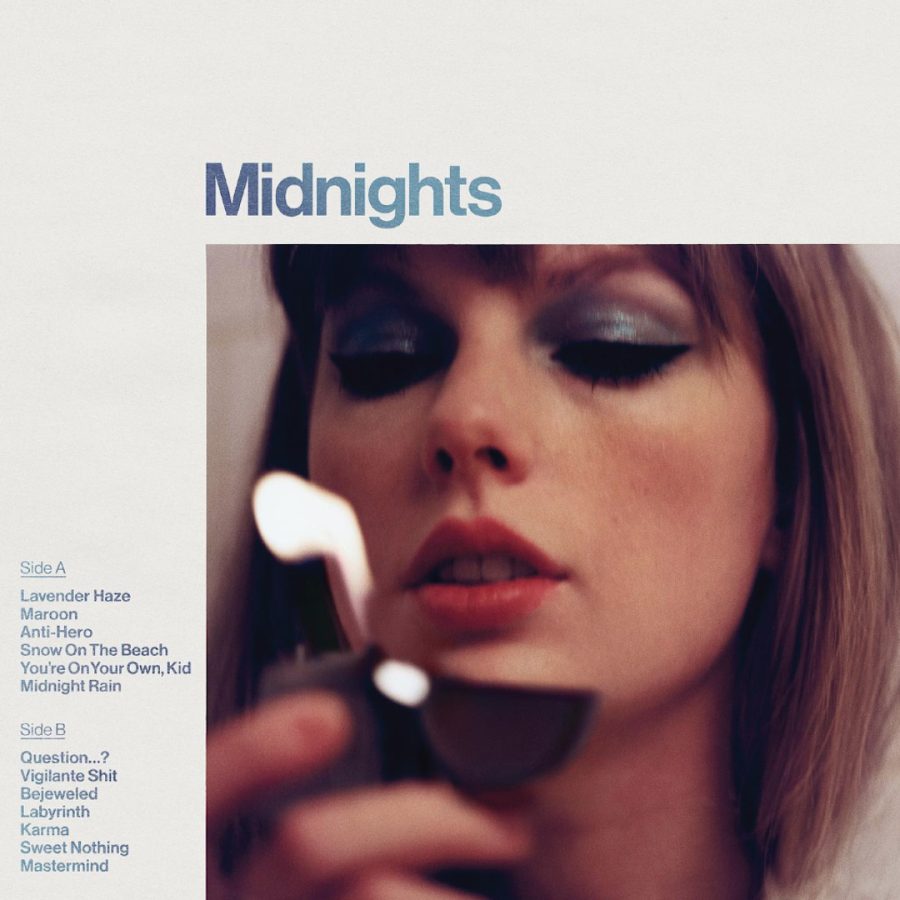If anyone knows how to generate interest and immense engagement for an upcoming album in a short period of time, it’s Taylor Swift.
Massive hype was built following Swift’s surprise album announcement at the MTV Video Music Awards in an acceptance speech on Aug. 29. A key component to any project Swift works on includes masterfully hidden Easter eggs (clues), weaved into anything she does publicly which perpetuates endless intricately constructed fan theories and buzz.
To add to the mystique, “Midnights Mayhem with Me” was a social media series she hosted, which incrementally revealed its 13 song titles over the past two months.
Shortly after the series concluded, Swift’s tenth studio album “Midnights” dropped when the clock struck midnight on Oct. 21. Then, three hours following the premiere of the album, Swift unexpectedly added seven bonus tracks to a deluxe version, fittingly named the “3am Edition.” Later that same day she released a music video for the song, “Anti-Hero” as well as lyric videos corresponding to each of her songs.
As a result of Taylor Swift’s genius marketing tactics and her die-hard fan base, also known as Swifties, the album amassed record-breaking numbers in its first days of debut.
History was made with “Midnights” shattering Spotify’s all-time record for most-streamed album in a single day with 184.6 million streams, doubling a previous record set by herself with the re-release of “Red (Taylor’s Version)” with 90.8 million streams.
The day after the “Midnights” release, Swift also became Spotify’s most-streamed artist in a single day.
Fans anticipated the sound of this new album because Swift’s genre has evolved drastically throughout the years. Sonically, “Midnights” is a more subdued electronic pop. As each of the songs were written about 13 sleepless nights at different times throughout her life and career, the composition seems to compliment her previous works.
The album has a combination of various stylistic aspects most apparently from “Evermore,” “Folklore,” “Lover,” “Reputation” and “1989.” In contrast, what makes this album so different from the rest is its more cryptic and explicit lyrics than ever before.
After a first listen, the album goes through a rollercoaster of emotional highs and lows. Initially it begins with dreamy, mesmerizing songs such as, “Lavender Haze” and “Maroon.” Just like the album “Lover,” both tracks reminisce about the feeling of being in love. Swift’s powerful use of colors paint the picture of how romantic relationships feel in many stages, even in its failures.
The mood shifts in angst with “Anti-Hero,” its blunt honesty unpacking insecurities about her body and mind. The lyrics “I’ll stare directly at the sun but never in the mirror,” vocalizes Swift’s hyper-criticism and dread about her appearance.
She reflects on her mental state as repressed memories surface in her head, with the lyrics “When my depression works the graveyard shift all of the people I’ve ghosted stand there in the room.” The chorus then self-deprecatingly exclaims that she is the “problem.” Quirky in the best way, the upbeat tempo ironically juxtaposes her depressing confessions.
The fourth track “Snow On The Beach” has a soft, whimsical vibe with Lana Del Rey as a feature. Many fans were ecstatic to discover these two pop powerhouses collaborated. Unfortunately, it falls short of its anticipation with Del Rey serving as merely a faint backing vocalist to Swift, masking her ability to shine through.
A dark, edgy turn suddenly emerges with “Vigilante Shit.” The heavy drum beats paired with her desire for revenge distinctly parallels the bad-girl persona from her previous album “Reputation.”
Similarly, “Karma” describes how her foes ultimately get what they deserve in the end. She playfully personifies the concept of karma as on her side being everything from her “boyfriend” to a “cat purring in [her] lap.”
In its entirety, Swift candidly uncovers her innermost thoughts with impactful, relatable themes surrounding self loathing, fantasizing about revenge, wondering what might have been, falling in love and falling apart.
Pop flow is prevalent as with every era of Taylor Swift’s discography, but lyricism is most authentically written on this album. “Midnights” will keep you tossing and turning, in deep introspective thought along with her all through the late night hours.









